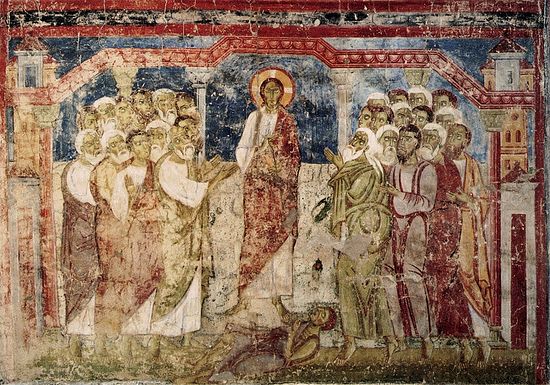Source: Ancient Christian Wisdom
People like those that like them. Being liked is intrinsically rewarding. It means we fit in; it puts us in a good mood, and even props up our self-esteem. So we smile at those who smile at us, we listen to those who listen to us, and we are interested in those who are interested in us. And all of this, as good as it feels and as right as it seems, is unrelated to virtue, the spiritual life, and holiness. It is just part of being human, which entails maintaining social relationships that are in our own best self-interest. Psychologists call this egoistic altruism. That description is not particularly flattering, but our Lord’s description is even more humbling, for He notes that such love is exhibited even by the most unscrupulous extortionists of His age who are usually grouped together with sinners and prostitutes. Loving those who love us may makes us feel good about them and about ourselves, but we should not deceive ourselves into thinking that therefore we are good Christians or virtuous people. We already have our reward for the love we give in so many ways.
According to Saint John Chrysostom, we are not only no different from publicans when we love only those who love us, but we are also worse than they are when instead of loving our enemies, we despise them and hate them, for we have the example of Christ loving His enemies and praying for them as well as the command of Christ that we love our enemies and pray for them, and yet we disregard the Lawgiver in order to follow the promptings of our passions and the whims of our will (To Demetrios on Compunction, PG 47.400). Elsewhere, Saint John notes that some Christians do not even manage to love those who love them. In which case, he asks, “is there even hope for salvation?” What the sacred father suggests that we do is to “subdue our thought” (δασμάσωμεν ἡμῶν τὸν λογισμόν), which is much like a wild animal that needs to be made tame or put under a yoke, so that it can work with us instead of fight against us, so that it can help us instead of hinder us (Homily 4 on Genesis, PG 53.47). In other words, when a thought of enmity raises its hateful head, we tame that thought, saying NO, and then bringing to mind our loving and humble Lord. Lord Jesus Christ have mercy on me. Lord Jesus Christ have mercy on him. Lord Jesus Christ have mercy on her. Whatever the case may be.
To subdue our thought, Saint John Chrysostom also instructs us “to prepare our thought” so that we “look at our enemies in a way that is tame,” (Homily 10 on Genesis, PG 53.93) which implies being ready to cooperate with them rather than struggle with them, being flexible around them rather than rigid, being gentle and meek, rather than callous and authoritarian. It means opening our hearts to them by opening our thoughts to the expansive love of Christ from which nothing can separate us, “neither death, nor life, nor angels, nor principalities, nor powers, nor things present, nor things to come, nor height, nor depth, nor any other creature” (Romans 8:38-39), unless we separate ourselves from Him by choosing not to love our enemies.
Saint Ephraim the Syrian teaches that loving those who love you, the love of the publicans, is the love of the dinner table to which friends are invited, but not enemies. For the Saint, to think of such love as though it were the love of Christ is pure delusion. The love Christians seek is “without hypocrisy, without blame, without moral stain, and without comparison. It bears all things and leads to every good thing. The Lord showed it to us, saying, ‘that one lay down his life for his friends,’ for the Lord taught this and did this, laying down his own soul not only for His friends, but also for His enemies. Indeed, God so loved the world that He gave His beloved Son for us. Regarding this love, the Apostle Paul full of divine love said: love does no ill to the neighbor, does not render evil for evil, insult for insult, but is always slow to anger, is always kind, is not jealous, is not irritable, does not take into account wrong doings, does not rejoice in injustice, but rejoices with the truth. It bears all things, believes all things, hopes all things, endures all things. Such love never fails” (Saint Ephraim the Syrian, On love,volume 5 of the collected works).




